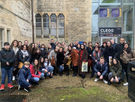SCIENCE FOR GIRLS
Mission
The Europe Science for Girls project aims to promote science among young girls through international collaboration and an innovative approach. Rather than relying on traditional methods that simply "encourage" girls to enter STEM (Science, Technology, Engineering, and Mathematics), the project introduces a cooperative model focused on missions related to climate change. These missions will engage students in real-world scientific challenges, enabling them to create new scientific narratives while enhancing skills in problem-solving, critical thinking, and teamwork.
Challenge
Despite years of efforts to engage girls in STEM, the proportion of girls pursuing science subjects remains low. Traditional interventions often focus on encouraging girls to adapt to existing science cultures, which can feel unwelcoming or out of reach. The challenge of the Europe Science for Girls project is to break away from these outdated approaches, offering an alternative that fosters collaboration and relevance. By focusing on real-world issues like climate change and allowing students to shape their own learning experience, the project aims to change how girls relate to science and demonstrate its value in their lives.
Methodology
The project follows a dual methodology, combining Climate Mission-Based Learning (vertical dimension) and Open Schooling (horizontal dimension). Through the climate missions, girls will explore issues such as sustainability, renewable energy, and environmental impact, gaining hands-on experience in scientific inquiry. The Open Schooling approach empowers students to direct and personalize their learning, promoting engagement and a deeper connection to the scientific process. This approach fosters collaboration, ensuring that students not only learn science but also develop a sense of ownership and agency in their education.
Outcomes
The project’s outcomes include the creation of a new, inclusive image of science that resonates with girls, a teacher's guide for implementing mission-based learning, and a climate change report co-created by the students. The report will showcase their research, findings, and proposed solutions to climate-related challenges, while reflecting on how the project has influenced their views on science. Additionally, policy recommendations will be generated, proposing ways to improve science education for girls. Funded by the Erasmus+ program, this project aims to inspire and prepare the next generation of female scientists and leaders in STEM across Europe.
Project financed by: ERASMUS +































